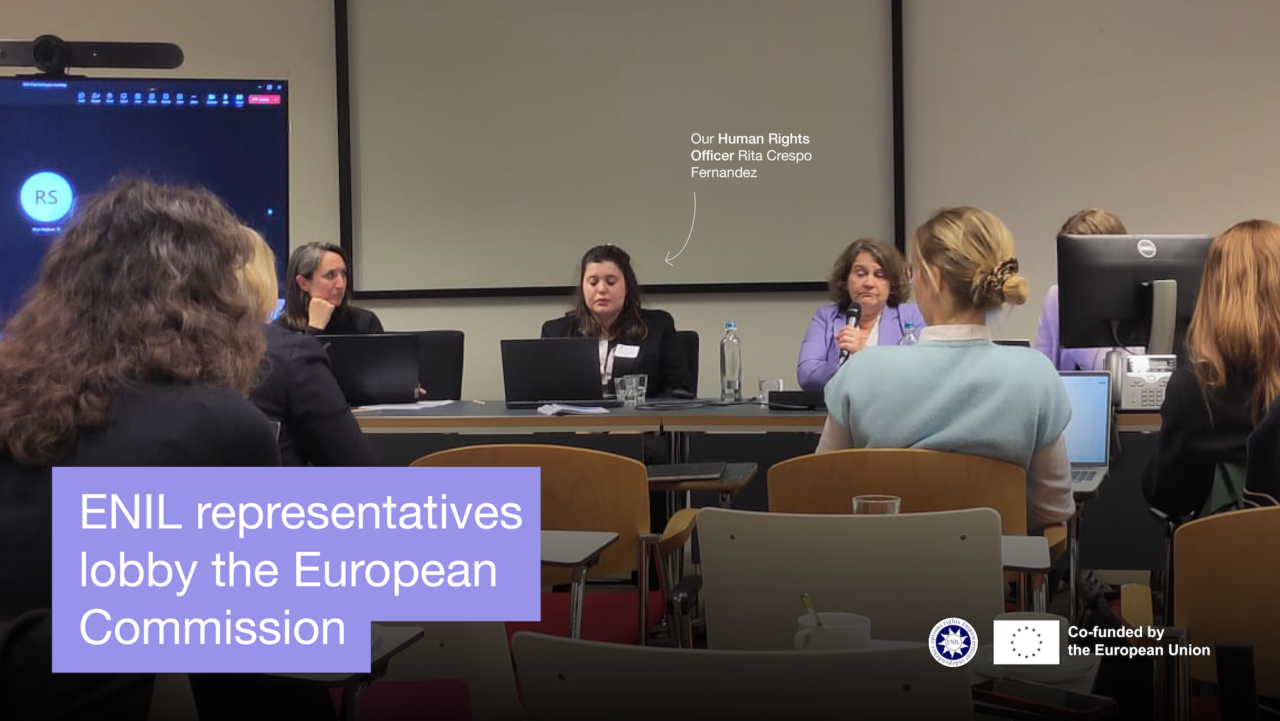On Monday, June 3rd, a delegation from the ENIL Secretariat participated in a civil dialogue meeting with the European Commission on the transition from institutional to community-based care. Human Rights Coordinator Rita Crespo-Fernandez and Policy Coordinator Florian Sanden spoke up and highlighted key elements for policies in support of Independent Living.
The meeting took place within the framework of the European Expert Group (EEG) on the transition from institutional to community-based care, which groups 12 European civil society organisations, and advocates for deinstitutionalisation and the promotion and development of community-based care.
The civil dialogue meeting was opened by Pietro Vittorio Barbieri, from the European economic and social committee, followed by EEG co-chairs Aurélie Baranger and Elizabeth Gosme.
The following session examined EU policy in terms of deinstitutionalisation.
Katarina Ivankovic-Knezevic, Director of Social rights and inclusion at the EU Commission’s DG for Employment, Social Affairs and Inclusion, affirmed the importance of independent living, and the alignment of the Commission’s work to the UNCRPD principles. She then focused on the European Strategy on the Rights of Persons with Disabilities, published in 2021. The Strategy included 7 flagships: to date, 5 of them have been completed, while the other 2, namely the Guidelines on Independent Living and Inclusion in the Community and the Guidelines on Social Services of Excellence, are due to be published soon. While recognising that many topics are still in need to be addressed by the two documents, Ivankovic-Knezevic claimed that the current time, in between two Commission terms, is a good momentum for independent living.
Irene Bertana, Senior Policy Officer at EASPD, then talked about the European Child Guarantee. The document emphasises the need for access in early childhood education and care and measures for children in alternative care. She further explained that the Commission’s recommendation on child protection services includes a statement on deinstitutionalisation that is in line with the UNCRPD. However, a large number of children with disabilities are still in institutions, due to the lack of support and challenges faced by their families. According to Bertana, this can be prevented by putting in place a system of early childhood intervention, as measures of deinstitutonalisation are only targeting a small part of children with disabilities. She then focused on the notion of early childhood intervention, defined as a system that aims at the good development of the child by supporting and training the families from the very first moment; a system that is aware of the risks in development and can act in situations of risk, through individualised, flexible plans that are to be realised with families, schools and the community the child lives in. For children protection to improve, Bertana claimed that it is essential to invest in family support, early childhood education and care, data collection both at national and EU level, prevention and early intervention measures.
This first part of the meeting was concluded by a time for questions from organisations representatives. ENIL’s policy coordinator Florian Sanden took the floor to express concern about the lack of real commitment to deinstitutionalisation on the part of EU countries, proven by the recent cuts to investments. He then stated how the Guidelines on Independent Living and Inclusion in the Community must not be a list of good principles, but need instead to have clear statements on the duties of member States, highlight the definition of institutions and have clear criteria against which deinstitutionalisation can be assessed. In response, he was reassured that community-based services will be the cornerstone of the Guidelines.
Then, a representative from Social Services Europe, highlighted how the focus should be on all children in institutionalised care, and not limited to those with disabilities.
The following part of the civil dialogue meeting centred on funding and deinstitutionalisation.
Ruth Paserman, Director of DG on Employment, Social Affairs and Inclusion, talked about the challenges in funding for deinstitutionalisation. She explained how the Commission is now going through a preparatory phase, where it is assessing what has and has not worked in the past.
ENIL human rights officer Rita Crespo Fernandez then took the floor to present the “EU Funds for Fundamental Rights” (FURI) project, which will involve six EU countries. EU funds have an obligation to comply with the Charter of Fundamental Rights; however, their misuse has often been reported by NGOs. Starting from this consideration, the FURI project aims at strengthening the capacity of stakeholders both at European and national level in order to raise awareness and ensure compliance of EU funding. The project will produce a report for each of the countries involved and a synthesis report, which will be published to raise awareness on these issues.
The event was concluded with another round of questions. Referring to a 2022 report by the EU Ombudsman on EU funds spent on institutions, Florian Sanden from ENIL asked about the Commission’s actions to respond to the issue. Commission officials replied that during 2021-2027, they believe the Commission is being stricter than before on this.
He then concluded his intervention by remarking that personal assistance, which is key to independent living, cannot be provided in residential facilities.



